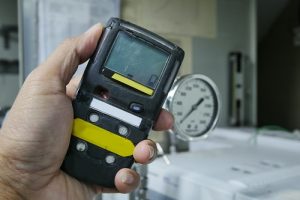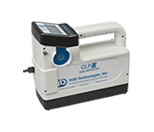Hydrogen sulfide gas is a naturally occurring compound that is also the byproduct of many industries. It’s common in the petroleum industry, natural gas extraction, pulp and paper manufacturing, rayon production, chemical industry, and waste management. It can also be generated whenever bacteria break down organic materials in an oxygen-depleted environment. Unfortunately, just because it’s common doesn’t mean that it’s safe. In fact, hydrogen sulfide is extremely dangerous, as it poses multiple hazards due to its toxic, flammable, and explosive properties. For that reason, an H2S gas detector is necessary to protect the lives of those who work in proximity to the gas.

An H2S gas monitor, whether fixed or portable, can serve as the first line of defense between employees and this dangerous substance. However, to fully insulate your business from the hazards of H2S, you must also know some of the basic characteristics of it. Keep reading to learn what you need to know about hydrogen sulfide gas.
Physical Properties
Hydrogen sulfide is a colorless gas that is flammable, poisonous, and corrosive. Because of this, it poses multiple threats to the safety of those who work in its proximity. One of its distinguishing properties is its intense odor, as hydrogen sulfide carries a powerful smell reminiscent of rotting eggs. But because the human olfactory sense can quickly be rendered scent blind through low-level exposure to hydrogen sulfide, some people in the presence of the gas no longer notice the odor shortly after initial exposure. Hydrogen sulfide is also heavier than air, which means that it can settle and accumulate in low-lying areas and amass at high concentrations in those locations.
Human Impact
Aside from its flammable and corrosive properties, hydrogen sulfide is dangerous to humans because of the toll it takes on the body’s core systems. Much like carbon monoxide, when inhaled hydrogen sulfide slowly suffocates the body’s cells. It prevents the uptake of oxygen once in the bloodstream and prevents cellular respiration, which is critical for life.
Short-Term Symptoms of Exposure
The short-term effects of exposure to low levels of the compound are rapid desensitization to its smell, followed by irritation of the mucous membranes such as the eyes and lining of the nose. If exposure persists, other short-term symptoms include labored respiration, headaches, dizziness, nausea, convulsions, and skin irritation. Short-term exposure to high concentrations of the gas takes an even greater toll and can result in paralysis, coma, respiratory failure, seizures, and spontaneous death.
Long-Term Symptoms of Exposure

After exposure has occurred, there can be continuing issues related to hydrogen sulfide inhalation that go beyond the short-term symptoms. Respiratory distress can continue for days after exposure. Damage to the central nervous system can be permanent. Delayed onset pulmonary edema, or fluid accumulation in the lungs, is another side effect that can occur up to 72 hours after the last exposure to hydrogen sulfide concentrations. Though hydrogen sulfide can be successfully expelled from the body, the damage it can cause lingers. Such long-term symptoms include low blood pressure, persistent headaches, and reduced appetite.
Treatment Following Exposure
Despite the seemingly dire consequences of hydrogen sulfide exposure, there is a treatment protocol that should be followed in the event that someone is exposed to hydrogen sulfide. First, the exposed individual should be immediately removed from the area of exposure, with care taken by rescuers to avoid toxic exposure to themselves. This may include respiratory protection. While there is no antidote applied in cases of H2S exposure, treatment in a hospital can reduce the impact of hydrogen sulfide ingestion.
If hydrogen sulfide poses a potential hazard in your workplace, consider a gas detection system for sale that can improve the safety of your employees and reduce the risk of H2S exposure. To learn more about hydrogen sulfide and the risks that are involved, contact DOD Technologies at (815) 680-6086.







